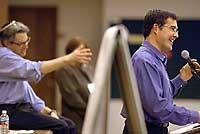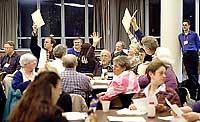Religious moderates finding their voice

In living rooms in Everett, Tacoma and Spokane, similar meetings of moderate and progressive religious groups are taking place, and when they do, a common theme invariably emerges: that their voices are not being heard above the roar of the more-organized religious right.
"It's a shame to me that the forces on the right have hijacked the Christian message to only give a narrow perspective on a few issues," said Angelina Godoy, a member of St. Mark's and a professor at the University of Washington who's been attending the workshop at St. Mark's.
In an election year marked heavily by the intersection of religion and politics, they are frustrated that discourse has centered largely on two issues: abortion and gay marriage. They're dismayed that, in the eyes of some, being faithful automatically means voting Republican. And they're frustrated that lost in the rhetoric surrounding abortion and gay marriage are issues central to their faith: alleviating poverty and working for peace and justice.
Locally and nationally, they're organizing and mobilizing. While their immediate goal is influencing this election, there's also a sense that they must start acting now — if belatedly — to build the infrastructure to ensure their voice gets heard in the future.
Nationally, groups such as the year-old Clergy Network for National Leadership Change, Mobilization 2004 and Call to Renewal have been drumming the message that poverty, war and health care are moral and religious issues that the faithful have a responsibility to act — and vote — on.
Locally, the Very Rev. Robert Taylor of St. Mark's and Rabbi Daniel Weiner of Temple De Hirsch Sinai have formed Faith Forward to devise ways of getting progressive religious voices heard more loudly. They've recently concluded a four-week workshop designed to remind participants what the Old and New Testaments say about social responsibility.
The Rev. Lisa Domke, a Presbyterian minister in Seattle, is coordinating local People of Faith for Kerry gatherings across Washington state. The 20 or so meetings held so far at private homes have drawn moderate to progressive evangelicals, Episcopalians and others to talk about which candidate better supports their faith values.
Both local and national organizers acknowledge they face a daunting task.
"The dynamic of a progressive approach just doesn't lend itself to a sound-bite, jingoistic approach that would rally true believers in the way it works for the right," Rabbi Weiner says. "It will take a lot of work."
Kevin Neuhouser, a sociology professor at Seattle Pacific University, says it's harder for religious progressives to be effective because "almost by definition, they are more willing to see the gray areas of politics. ... Even among themselves, they are not as cohesive or unified in a single message."
The Rev. Joseph Fuiten, a conservative evangelical pastor at Bothell's Cedar Park Assembly of God Church, recently headed a voter-registration effort that he says garnered 45,000 new voters in this state. Fuiten says it's not fair to say that religious conservatives have hijacked Christianity or that they have a narrow perspective.
In his view, it's the religious left that has hijacked the faith on issues such as homosexuality, turning their backs on scriptural prohibitions and thousands of years of church tradition.
Christian conservatives, he says, are every bit as concerned about issues such as poverty, war and peace. It's just that their more pressing concerns right now are abortion and gay marriage because "those are the areas that the liberal left have advanced."
"Those are the things that are under attack, so we're defending those things," he says.
Patricia O'Connell Killen, chairwoman of Pacific Lutheran University's religion department, says religious conservatives have been so successful because they have merged formidable organizational skills with savvy marketing techniques and clear, compelling messages.
"They've always been adept at drawing on techniques and resources from the larger culture, including the world of business," Killen says. "And they're very well organized. They always have been. They tend to preach a gospel and theology that are simple, direct, accessible."
Tom Sine, a progressive evangelical in Seattle who teaches at Fuller Theological Seminary and has written about the biblical view of social responsibility, acknowledges the success of religious conservatives.
Progressive evangelicals haven't been as successful, he said, because their numbers are fewer and they "just don't seem to have the same appetite for power and influence."
But Jim Wallis, a progressive evangelical and editor of the national Sojourners magazine, is encouraged by his recent 15-city tour for Call to Renewal, an anti-poverty organization formed by evangelicals, mainline Protestants and others. He sees such organizations building a progressive religious social movement — much as Martin Luther King Jr. did with the civil-rights movement.
But for such a movement to take hold, religious progressives must become more aggressive in their tactics and clearer in their message, says the Rev. Albert Pennybacker, chairman of the Clergy Network for National Leadership Change, a Washington, D.C.-based advocacy group.
"As progressives, we've been committed to the separation of church and state, and we still are," he said. "But we've interpreted that to mean we have to be silent bystanders in the electoral process. We are not that anymore."
But he acknowledges part of what may make these goals difficult for progressives is their very commitment to hearing all sides. He cites his many years with the National Council of Churches (NCC), an umbrella organization of 36 denominations. "It takes two years [for the NCC] to make a public-policy statement," Pennybacker said. "It has to be that way when you have 36 blankin' denominations that have to approve it."
Domke, the local coordinator of People of Faith for Kerry, acknowledges that even those who attend the gatherings hold a wide variety of views on issues such as abortion and gay marriage. "It's not as easy to speak with one voice," she said. "But what we're trying to do is say: Across all these different places where we're coming from, we share some of the same values."
That's Weiner and Taylor's goal as well with Faith Forward and their workshop. At the very least, Taylor said, he hopes it will help people not used to talking about their faith publicly to do so.
Sine, the instructor at Fuller Theological Seminary, also longs to see an approach that emphasizes shared values.
Religion should not be about left or right, Republican or Democrat, he says. "We need to be the voice of a third way that flows out of biblical values, instead of buying into the political ideology of either the right or the left."
Janet I. Tu: 206-464-2272 or jtu@seattletimes.com
